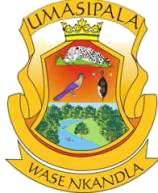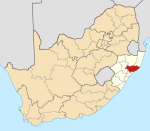Ulundi, also known as Mahlabathini, is a town in the Zululand District Municipality. At one time the capital of the Zulu Kingdom in South Africa and later the capital of the Bantustan of KwaZulu, Ulundi now lies in KwaZulu-Natal Province. The town now includes Ulundi Airport, a three-star hotel, and some museums amongst its sights. In the 2024 Census, the population of the town was recorded as 30,828.

KwaZulu-Natal is a province of South Africa that was created in 1994 when the government merged the Zulu bantustan of KwaZulu and Natal Province.

The Inkatha Freedom Party is a conservative political party in South Africa, which is a part of the current South African government of national unity together with the African National Congress (ANC). Although registered as a national party, it has had only minor electoral success outside its home province of KwaZulu-Natal. Mangosuthu Buthelezi, who served as chief minister of KwaZulu during the Apartheid period, founded the party in 1975 and led it until 2019. He was succeeded as party president in 2019 by Velenkosini Hlabisa.

Goodwill Zwelithini kaBhekuzulu was the King of the Zulu nation from 1968 to his death in 2021.
Inanda or eNanda is a township in Durban KwaZulu-Natal, South Africa that is situated 21 km north-west of Durban. It forms part of eThekwini, the Greater Durban Metropolitan Municipality. Populated primarily by Zulu-speaking Black Africans, Inanda is the home of John Langalibalele Dube, first President of the African National Congress (ANC), a former residence and base of operations of Mahatma Gandhi, and the birthplace of the syncretic Nazareth Baptist Church

iLembe is one of the 11 district municipalities of KwaZulu-Natal province in South Africa. The seat of iLembe is KwaDukuza. The majority (82%) of its 606,809 people speak isiZulu as their first language. The district code is DC29. It was formerly named the King Shaka District Municipality.

King Cetshwayo District Municipality is one of the 11 district municipalities ("districts") of KwaZulu-Natal province in South Africa. The seat of the district is Richards Bay. The majority of its 885 944 people speak Zulu. The district code is DC28. It is named after Cetshwayo kaMpande, King of the Zulu Kingdom from 1872 to 1879, who led his nation to victory against the British in the Battle of Isandlwana.
The Zulu royal family, also known as the House of Zulu consists of the King of the Zulu Nation, his consorts, and all of his legitimate descendants. The legitimate descendants of all previous kings are also sometimes considered to be members.

Municipal elections were held in South Africa on 18 May 2011, electing new councils for all municipalities in the country. Municipal elections are held every five years, and the previous municipal elections were held in 2006. The first municipal elections following the reorganisation of municipalities took place in December 2000.
Gingindlovu, officially renamed to KwaGingindlovu, is a town in the King Cetshwayo District Municipality, part of the KwaZulu-Natal province of South Africa.

Nkandla Local Municipality is an administrative area in the King Cetshwayo District of KwaZulu-Natal province in South Africa. The town of Nkandla is the home town of the former President of South Africa, Jacob Zuma.

Hlabisa was an administrative area in the Umkhanyakude District of KwaZulu-Natal in South Africa. Hlabisa is an isiZulu surname of the two nkosis (kings) in the area. The municipality was situated within the vicinity of four Tribal Authorities which are the Mkhwanazi Tribal Authority, the Mdletshe Tribal Authority, and two Hlabisa Tribal Authorities.
eSikhaleni popularly known as eSikhawini is a town in the King Cetshwayo District Municipality of the KwaZulu-Natal province of South Africa.
Kwambonambi is a town in King Cetshwayo District Municipality in the KwaZulu-Natal province of South Africa.
Mpumalanga, also widely known as Hammarsdale, is a township located in the eThekwini Metropolitan Municipality in the KwaZulu-Natal province of South Africa. It is situated some 10 km south-south-east of Cato Ridge and some 50 km west of Durban. Derived from Zulu, the name means 'sunrise', 'the sun comes out'.
Events in the year 2013 in South Africa.
The Qwabe Kingdom is the senior branch of the House of Malandela, the royal pre-Zulu family, descendant from Qwabe (1575) the son of Malandela or Mayandeya.
Thembeka Vuyisile Buyisile Mchunu is a South African politician from KwaZulu-Natal serving as a Member of the National Assembly of South Africa since 2019. A member of the African National Congress, she served as the Executive Mayor of the Uthungulu District Municipality from 2011 to 2016. She is married to Senzo Mchunu, the current Minister of Water and Sanitation and the former premier of KwaZulu-Natal.

Arthur Thamsanqa Ntuli is a South African politician who is the Provincial Chairperson of the Inkatha Freedom Party in KwaZulu-Natal. He is the former mayor of Nkandla Local Municipality and King Cetshwayo District Municipality, currently serves as the Premier of KwaZulu-Natal.
The Government of KwaZulu-Natal is the subnational government of the South African province of KwaZulu-Natal (KZN). The politics of the province take place in the framework of a constitutional monarchy and liberal multi-party parliamentary democracy within a constitutional republic whereby the King of the Zulu Nation is the ceremonial figurehead of an elected government. The provincial government comprises the second sphere of government of South Africa and consists of three branches with checks and balances between them as follows:













